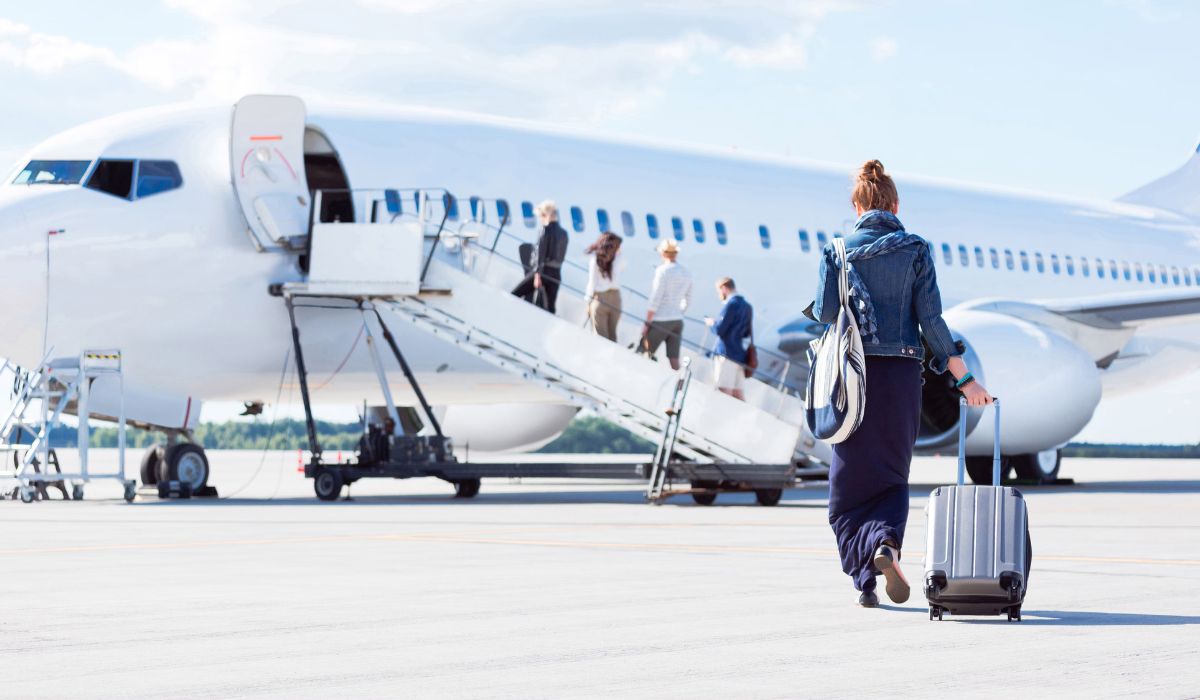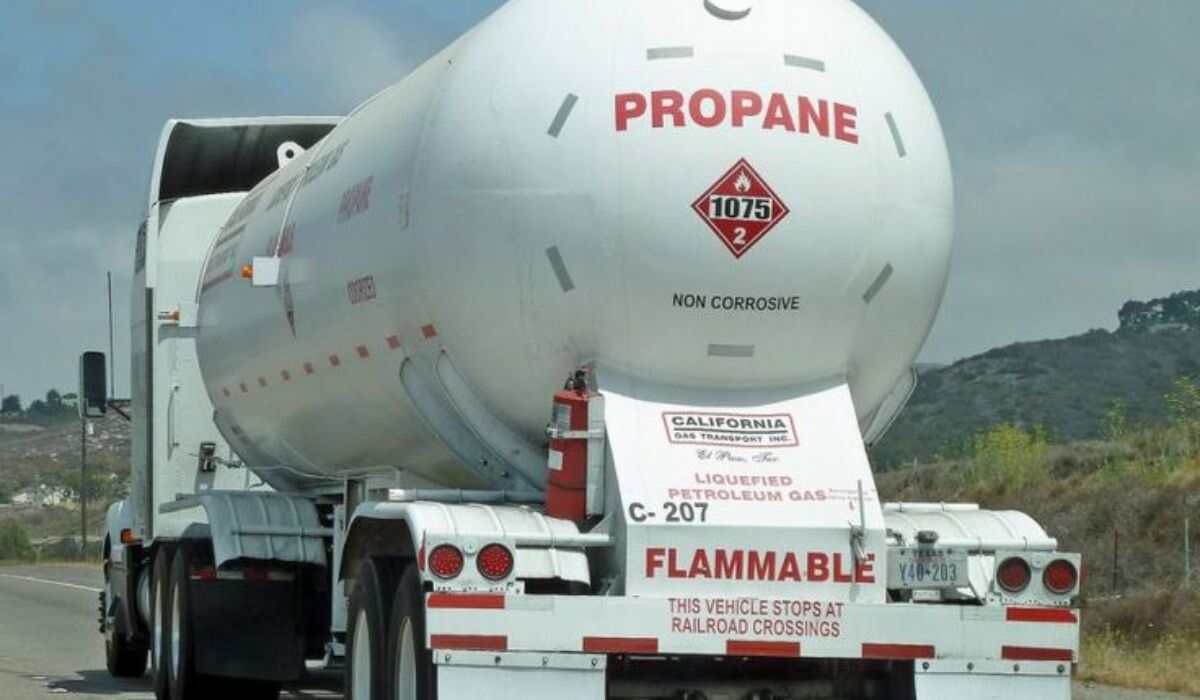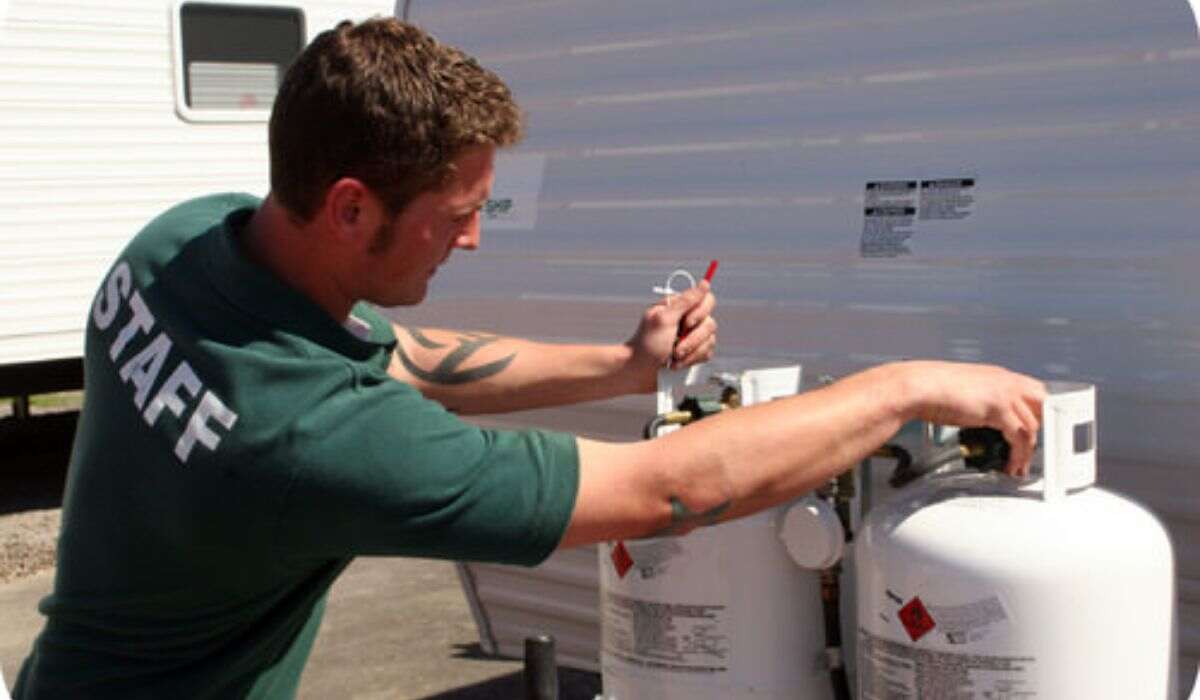Travel with propane on airplanes is a no-go for flyers in the USA. This strict rule often catches outdoor enthusiasts and campers off guard when planning their adventures. Propane, a staple fuel for portable stoves and lanterns, is classified as a hazardous material by airlines and aviation authorities.
Despite its usefulness in the great outdoors, propane’s flammable nature makes it a safety risk in pressurized aircraft cabins. Understanding these regulations is crucial for anyone looking to pack their camping gear for a flight.
While this restriction might seem like a hurdle, savvy travellers have found creative workarounds to keep their outdoor plans on track. Let’s explore the world of air travel and camping fuel, uncovering alternatives and tips to ensure your next trip takes off without a hitch.
Understanding Propane: The Camper’s Best Friend
Propane, a liquefied petroleum gas, is a popular fuel choice for campers and outdoor enthusiasts. It’s used in portable stoves, lanterns, and heaters, making it a go-to for those who love to rough it in the wild. But its flammable nature raises red flags when it comes to air travel.
Why do people want to bring propane on planes?
- Convenience of using familiar equipment
- Cost savings compared to buying or renting at the destination
- Reliability of personal gear
The risks associated with propane in pressurized cabins have led to strict regulations.
FAA and TSA Regulations: The Hard Truth
Let’s cut to the chase: You cannot bring propane tanks or cylinders on airplanes, period. This rule applies to both carry-on and checked baggage. The Federal Aviation Administration (FAA) and Transportation Security Administration (TSA) are crystal clear on this point.
Why the strict ban?
- Fire hazard in pressurized environments
- Potential for explosions
- Difficulty in controlling leaks at high altitudes
Penalties for non-compliance
- Hefty fines (up to $75,000 for individuals)
- Potential arrest and criminal charges
- Being barred from flying
“Safety is our top priority. Propane cylinders are strictly prohibited on aircraft due to their volatile nature.” – TSA spokesperson
Alternatives to Traveling with Propane
Don’t let the propane ban deflate your travel plans. Savvy adventurers have found workarounds:
- Camping stove options:
- Alcohol-based stoves (approved for air travel when empty)
- Solid fuel tablet stoves
- Electric hot plates (for areas with power)
- Fuel substitutes:
- White gas (still restricted but easier to find alternatives)
- Butane (some forms allowed in checked baggage)
- Renting equipment:
- Many destinations offer camping gear rentals
- Local outdoor shops often have rental services
Safely Packing Propane-Powered Devices
If you’re bringing propane-powered devices without the fuel, follow these steps:
- Empty the fuel completely
- Clean the device thoroughly
- Leave fuel lines and chambers open to air out
- Pack in a way that allows for easy inspection
Documentation tip:
Include a note explaining the device has been emptied and cleaned for air travel. This can speed up security checks.
The Regulations Around Transporting Fuel on Planes
As anyone who enjoys camping or grilling outdoors knows, propane is an essential fuel. But what about traveling with it? If you’re flying somewhere for a camping trip, can you bring propane on the plane with you?
The short answer is yes, it is allowed, but there are some important guidelines to follow set by the Transportation Security Administration (TSA) and international aviation organizations. When it comes to transporting any type of fuel or flammable gas as checked baggage, the main restrictions come down to quantity limits and proper container requirements.
TSA and International Regulations
According to the TSA, passengers are permitted to carry a limited amount of fuel in their checked bags on both domestic and international flights departing from or flying within the United States. The standard limit is 5 pounds or 2.26 kilograms of fuel per passenger in containers no larger than 4 gallons/16 liters each.
The International Civil Aviation Organization (ICAO) has similarly established guidelines allowing a maximum of 2 pounds/1 kilogram of fuel per container when transporting checked luggage internationally.
All fuel containers must be in sturdy packaging, have safety caps, and be unable to leak even if accidentally inverted or punctured.
Transporting Propane Specifically
Propane cylinders fall under these generalized fuel transportation rules. As long as each individual propane cylinder contains no more than 5 pounds of propane and meets packaging standards, a traveler is legally permitted to include properly packed propane canisters in their checked bags on domestic flights in the USA.
The same transportation allowance applies on international flights as long as the origin and destination countries both follow ICAO standards. It’s always a good idea to double-check any restrictions with your specific airline as well, as individual carrier policies may be more limiting.
Proper Preparation Is Key
To avoid issues at security checkpoints or in the plane hold, it’s crucial to properly prepare propane canisters for travel according to regulations. Here are some best practices:
Packaging
- Use purpose-built carrying cases with padding to protect cylinders from damage
- Secure caps or valves to prevent accidental release during transport
Labels
- Clearly label packages as containing “flammable gas” or “liquefied petroleum gas (LPG)”
- Include your contact details on the labels
Packing
- Remove any gas regulators or extra attachments before packing cylinders
- Do not pack propane with other flammable items like lighters or fuel
- Don’t pack propane in checked bags if leaking is evident
Alternative Options
- If traveling internationally, check destination country restrictions
- Consider lightweight portable camp stoves that don’t rely on disposable fuel canisters as an alternative
To summarize, transporting propane on planes is allowed when properly packaged and within quantity limits. However, it’s always best to plan ahead and check with airlines just in case. With careful preparation, travelers can feel confident bringing fuel for an outdoor adventure.
The rules are subject to change, and it’s wisest to have backup plans. Pack checklists, follow guidelines closely, and have a great trip! Let me know if you need any other travel tips.
International Travel Considerations
Traveling abroad? Remember that regulations can vary by country. Here’s a quick guide:
| Region | Propane Policy | Notes |
| USA | Prohibited | Strict enforcement |
| EU | Prohibited | Similar to US rules |
| Canada | Prohibited | Aligned with US policies |
| Australia | Prohibited | Strict quarantine laws may apply to equipment |
Always check with your airline and the destination country’s aviation authority before flying.
Expert Tips for Outdoor Enthusiasts
Don’t let fuel restrictions ground your adventures. Try these expert-approved strategies:
- Plan your trip around fuel restrictions:
– Research local fuel availability
– Consider non-propane cooking methods (e.g., campfires where allowed)
- Invest in TSA-approved gear:
– Multifuel stoves that can run on easily found fuels
– Solar-powered devices for lighting and charging
- Creative solutions from seasoned travelers:
– Use a mail forwarding service to ship supplies ahead
– Join local outdoor groups for gear-sharing opportunities
Case study:
Sarah, an avid backpacker, switched to an alcohol-fuel stove for her international trips. “It’s lighter, and I can find fuel anywhere that sells liquor,” she says. “Plus, no hassles at security!”
The Future of Propane and Air Travel
While propane remains a no-go for air travel, the outdoor industry is evolving:
Emerging technologies: New, safer fuel alternatives are in development
Potential policy changes: As technology improves, regulations may adapt
Sustainable travel trends: Eco-friendly fuel options are gaining popularity
Keep an eye on industry news. The landscape of travel-friendly camping fuels is always changing.
Navigating Air Travel Without Propane
can you travel with propane on airplane? The answer is a resounding no. But don’t let that stop you from planning your next outdoor adventure. With a bit of creativity and preparation, you can still enjoy the great outdoors without compromising on safety or convenience.
Key takeaways:
- Propane is strictly prohibited on all flights
- Explore alternatives like alcohol stoves or rental equipment
- Always check regulations, especially for international travel
- Invest in versatile, travel-friendly outdoor gear
The joy of outdoor adventures lies in the experience, not the fuel you use to cook your meals. Stay safe, plan ahead, and happy trails!
Frequently Asked Questions
Can I bring a small propane tank on a plane?
No, propane tanks of any size are prohibited on all flights.
What happens if TSA finds propane in my luggage?
The propane will be confiscated, and you may face fines or legal consequences.
Are there any exceptions to the propane ban?
No exceptions exist for passengers. Only certain professionals (like hot air balloon operators) can transport propane under special conditions.
How do I dispose of propane before a flight?
Contact local hazardous waste facilities or propane suppliers for proper disposal methods.
Can I ship propane to my destination instead?
Propane is considered hazardous material and is restricted in standard shipping. Specialized hazmat shipping services may be available but are often costly.
Conclusion
Traveling with propane on airplanes is a firm no-go. While this might throw a wrench in your camping plans, it’s crucial for everyone’s safety. Don’t let it dampen your adventurous spirit, though. With a bit of creativity and planning, you can still enjoy your outdoor escapades.
Consider alternative cooking methods, invest in travel-friendly gear, or explore local rental options. The heart of camping lies in the experience, not the specific fuel you use.
By staying informed about airline regulations and thinking outside the box, you’ll be well-equipped to tackle any travel challenge. So pack smart, fly safe, and get ready to create lasting memories in the great outdoors – propane or no propane.
















